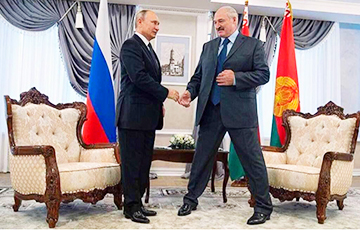Lukashenka Risks to Get Lost in Priorities
9- 13.09.2019, 13:33
- 17,846

The dictator will not be able to say no to Moscow if Russia wants to deploy missiles in our country.
Lukashenka says that the Russian-Belarusian relations are the poster child, while their "development and deepening" are "of the greatest priority of the Belarusian foreign policy". Analyzing the foreign policy of the country, experts argue that it's more vital for the Belarusian authorities to keep the balance of relations between East and West, Nezavisimaya Gazeta writes.
"Your country is the main strategic partner and ally of Belarus, while the relations of our brotherly peoples are bound by friendship, good common history, sometimes sprinkled with blood," Aliaksandr Lukashenka stated on September 12th when accepting the credentials of Russian Ambassador to Minsk Dmitry Mezentsev. In this regard, "the development and deepening of multifaceted bilateral ties with Russia are of the greatest priority of the Belarusian foreign policy," he added.
Such priorities do not mean that Belarus will build relations with Russia at the expense of other neighbouring countries. "We aim to build good-neighbourly and pragmatic relations with the European Union, which do not imply a choice between East and West," he said, addressing the new head of the EU Delegation to Belarus, Dirk Schuebel.
According to Lukashenka, the preservation of such a balance allows the country to act as an intermediary in the settlement of regional conflicts. Moreover, it also enables the country to claim participation in international dialogue. "Disagreements among the key global players in the field of arms control makes the development of new approaches to ensure international and regional security more urgent, and thus the demand for the Belarusian initiative to resume the relevant international dialogue," Aliaksandr Lukashenka said.
Commenting on the latest foreign policy actions and statements of the official Minsk, experts increasingly draw attention to the forced nature of such a position of Belarus, which, due to some circumstances, is in the midst of a clash of interests of the world's top players - Russia and the United States. Recent visits of high-ranking officials of these countries have revived the discussion on the complex foreign policy choice of the official Minsk.
It will be recalled that on August 29th, a former National Security Advisor of the United States, John Bolton, visited Minsk. Donald Trump fired him almost immediately upon his return, but, according to most experts, it will not affect the relations between Minsk and Washington D.C. Then, September 10, Secretary of the Security Council of Russia Nikolai Patrushev visited the Belarusian capital. In both cases, official reports are rather abbreviated and diplomatic. The U.S. official confessed that they hadn't agreed on anything specific with Aliaksandr Lukashenka, but talked about everything. He assessed the meeting as important.
Nikolai Patrushev admitted the discussion of "new challenges and threats" to regional security, in particular, the deployment of U.S. missiles in Eastern Europe. "The missiles that will be deployed there can reach out to our territory. We must take this into account," BelTA quoted the head of the Russian Security Council.
Belarusian experts believe that both Bolton and Patrushev could be interested in whether Aliaksandr Lukashenka was ready to deploy Russian missiles on his territory. "I think Lukashenka can hardly refuse the deployment of Russian missiles," the Belarusian military expert Aliaksandr Alesin assumes.
At the same time, Minsk may say "no" to Moscow. "We can't say that Belarus is turning into a springboard for Russian arms - everything necessary is being prepared. Of course, this is the last thing Lukashenka wants, but he is under double pressure: Poles and Americans are on the one hand, Russians are on the other.
It will be very hard for Lukashenka to resist," the expert said.
"Let's recall the flat denial of Lukashenka to deploy the Russian airbase in 2015, although Vladimir Putin had already signed an order to hold negotiations in this regard. It's easy to guess that the Belarusian leadership is not keen to deploy the Russian missiles.
According to political analyst Aliaksandr Klaskouski, if Russian missiles appear in Belarus, the country itself becomes a target. Second, it will destroy the carefully developed image of Belarus as a peacekeeper. Third, relations with neighbouring countries and the West as a whole, which have barely begun to improve, will deteriorate. And finally, it is a threat to the incorporation of Belarus, which Aliaksandr Lukashenka repeatedly hinted at and which is discussed by experts out in the open. So far, this threat is expressed by the requirement to "further integration," and Belarus does its best to bring it to the economic field.









